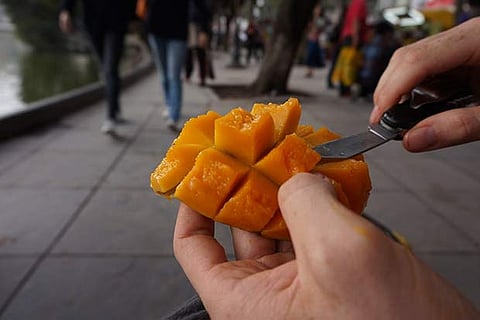

New Delhi
“When the mango season starts in March, varieties such as alphonso, badami and banganapalli hit the market and they get attractive rates and export opportunities. However, when mangoes from the northern parts arrive by late June and July, there is no demand, which results in poor returns to farmers,” says Agricultural and Processed Food and Products Export Development Authority (APEDA) Chairman DK Singh.
“So we have decided to promote these varieties (daseri, chausa, langda) globally and locally. If everything goes as per plan, mangoes from Malihabad (in Uttar Padesh) will set off to Iran this year,” he added. This follows the Food and Drug Administration Department of Iran accepting the Indian Embassy’s invitation to examine local mango varieties in Malihabad, the core area of mango production in north India.
The promotion of these mangoes will also result in better prices in local markets as well, APEDA officials hoped. After a decline in exports in 2015-16, there was a surge in 2016-17. As per APEDA data, India exported 45,563 tonnes of mangoes in 2016-17 (April-November) - a hike of 20 per cent over the 36,329 tonnes exported in 2015-16. However, exports from North India were found to be low.
“At present, daseri from Uttar Pradesh is being exported but the quantity is less. Now, the demand for mangoes abroad, including the US, has seen a steady increase in the past few years. So, we want to promote the late-arriving varieties as well,” APEDA DGM Sudhanshu said.
Meanwhile, mango growers welcomed the APEDA’s efforts but also demanded the necessary facilities to ensure their success. Malihabad grower Kaleem Ullah Khan, who was in 2008 awarded the Padma Shri, India’s fourth-highest civilian honour, for developing innovative varieties of mangoes, sought a subsidy in air-freight charges to flourish in the global market.
“During exhibitions in Gulf countries, our mangoes fared well, defeating those from Pakistan in quality. However, our rates are higher than those from Pakistan since our government does not give any subsidy in air-transport charges,” Khan said.
Echoing Khan, Insram Ali, President of the Mango Grower’s Association of India, said the government should provide better transport facilities, including an increase in the subsidy for brand promotion and air-freight of up to 50 per cent.
“While alphonso in Maharashtra reaches Rs 1,200 per dozen, Malihabad mangoes fetch a maximum Rs 80-90 per kg. If we effectively succeed in promoting these mangoes abroad, especially in the Gulf countries, we will get a fair price,” Ali said. The government, however, will have to take measures for preserving Malihabad mangoes while exporting them since their shelf life is of just 4-5 days as against 12-15 days for alphonsos, Ali cautioned.
Visit news.dtnext.in to explore our interactive epaper!
Download the DT Next app for more exciting features!
Click here for iOS
Click here for Android